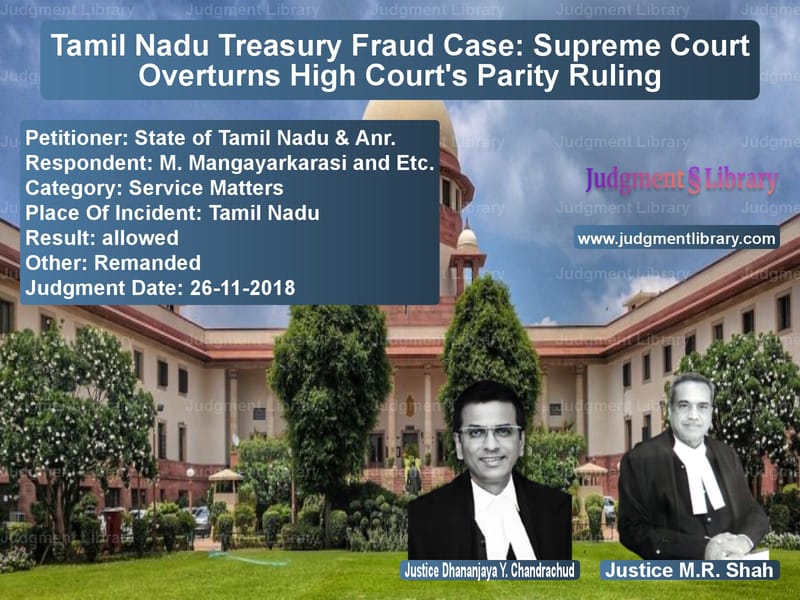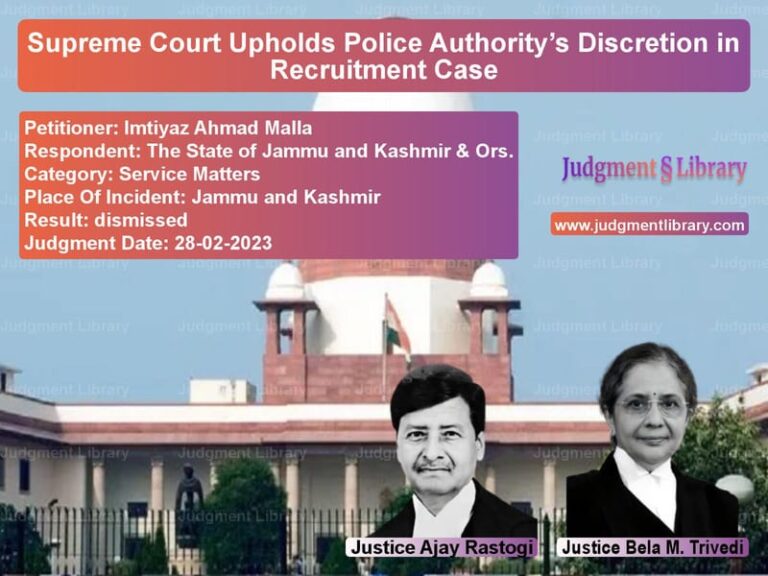Tamil Nadu Treasury Fraud Case: Supreme Court Overturns High Court’s Parity Ruling
The case of State of Tamil Nadu & Anr. vs. M. Mangayarkarasi and Etc. centers around a significant financial misappropriation within the Tamil Nadu Treasury Department. The Supreme Court was called upon to decide whether the punishment imposed by the disciplinary authority was just or if the High Court had erred in modifying it.
The key issue in this case was the fraudulent misappropriation of funds amounting to Rs. 1.22 crores through 257 bogus bills processed at the District Treasury Office, Salem, between 1997 and 2000. The Tamil Nadu government dismissed several employees, including the respondents, for their roles in this fraud. The High Court, however, reduced their punishment to a mere stoppage of increments, citing parity with other accused employees. The Supreme Court had to determine whether this approach was legally sound.
Background of the Case
The respondents, M. Mangayarkarasi and M. Jayalakshmi, were employed as Superintendent and Accountant, respectively, in the District Treasury at Salem. They were responsible for verifying and sanctioning bills submitted by the office of the Assistant Commissioner of Commercial Taxes.
A special audit uncovered that 257 bogus bills had been processed, leading to a loss of Rs. 1.22 crores to the state exchequer. Following a disciplinary inquiry, charges were framed against 11 employees. The government dismissed the respondents from service after finding them guilty of failing to prevent the fraud.
The dismissed employees challenged their removal before a Single Judge of the Madras High Court, who ruled that the punishment was disproportionate. The judge modified their penalty to the stoppage of increments for two years. The State of Tamil Nadu appealed against this ruling, but a Division Bench of the High Court upheld the Single Judge’s order, stating that the principle of parity applied since other employees received lesser punishments.
Arguments by the Petitioner (State of Tamil Nadu)
- The dismissed employees were directly responsible for verifying 90 and 105 fraudulent bills, respectively, which contributed to the misappropriation of Rs. 45.28 lakhs and Rs. 51.98 lakhs.
- Other employees who received lighter punishments had processed fewer fraudulent bills and caused lower financial losses.
- The High Court erred in applying parity since the degree of negligence and misconduct varied significantly among the accused.
- Judicial review in disciplinary matters should be limited, and courts should not interfere with the employer’s discretion unless the penalty is shockingly disproportionate.
Arguments by the Respondents
- The High Court correctly applied the principle of parity since all accused employees were charged under similar provisions.
- Their failure was procedural, and there was no evidence of personal financial gain.
- Since they had already retired, a lenient view should be taken.
- The State failed to demonstrate why they deserved harsher punishment than their co-accused.
Supreme Court’s Judgment
The Supreme Court overturned the High Court’s decision, ruling that:
- The principle of parity was misapplied because the financial loss caused by the respondents was substantially greater than that caused by other employees.
- Judicial review in disciplinary cases should not involve substituting the court’s judgment for that of the employer unless the punishment is wholly unreasonable.
- The severity of the misconduct and the loss to the state justified the penalty of removal from service.
- The High Court failed to recognize the fundamental difference in culpability among the accused employees.
The Court observed:
“Parity could not be applied for the simple reason that there is a material distinction in the case of the misconduct alleged against the appellants as compared to the other employees.”
Conclusion
The Supreme Court’s ruling reinforces the principle that the proportionality of punishment must be determined based on the severity of the offense. It establishes that judicial intervention in disciplinary matters should be exercised with caution and only in cases of manifest injustice.
By remanding the matter to the High Court for fresh consideration, the Supreme Court ensured that all legal aspects, apart from the issue of parity, would be properly adjudicated. This judgment sets a significant precedent in public service disciplinary cases, affirming that courts must carefully evaluate the unique circumstances of each case rather than applying a blanket approach of parity.
Petitioner Name: State of Tamil Nadu & Anr..Respondent Name: M. Mangayarkarasi and Etc..Judgment By: Justice Dhananjaya Y. Chandrachud, Justice M.R. Shah.Place Of Incident: Tamil Nadu.Judgment Date: 26-11-2018.
Don’t miss out on the full details! Download the complete judgment in PDF format below and gain valuable insights instantly!
Download Judgment: State of Tamil Nadu vs M. Mangayarkarasi an Supreme Court of India Judgment Dated 26-11-2018.pdf
Direct Downlaod Judgment: Direct downlaod this Judgment
See all petitions in Disciplinary Proceedings
See all petitions in Public Sector Employees
See all petitions in Termination Cases
See all petitions in Judgment by Dhananjaya Y Chandrachud
See all petitions in Judgment by Mukeshkumar Rasikbhai Shah
See all petitions in allowed
See all petitions in Remanded
See all petitions in supreme court of India judgments November 2018
See all petitions in 2018 judgments
See all posts in Service Matters Category
See all allowed petitions in Service Matters Category
See all Dismissed petitions in Service Matters Category
See all partially allowed petitions in Service Matters Category







